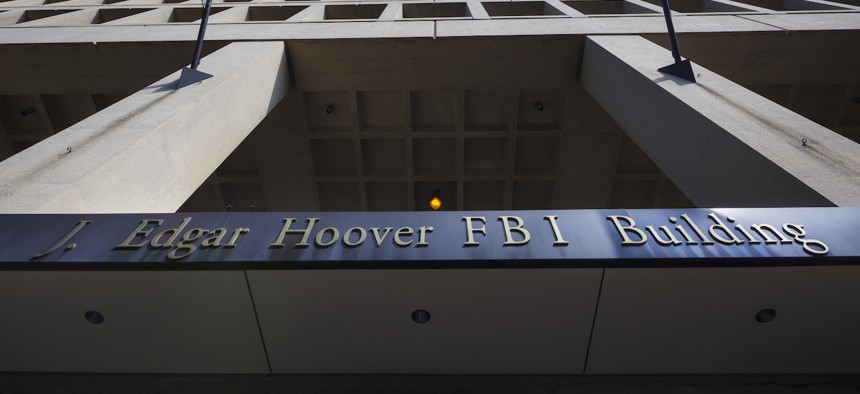
Public comments are due by May 30. Jon Hicks/Getty Images
FBI Whistleblower Protections May Finally Catch Up With Obama-era Policy Changes
The Justice Department also wants to know how it can further increase “fairness, effectiveness, efficiency and transparency” for whistleblowers.
The Justice Department published a proposed rule on Wednesday that would revise regulations on FBI whistleblower policies. The new rule would include changes from a 2012 presidential policy directive on protecting whistleblowers with access to classified information, and the 2016 FBI Whistleblower Protection Enhancement Act of 2016, both enacted under the Obama administration.
“The FBI supports the right of whistleblowers to bring forward concerns of waste, fraud, or abuse,” said the FBI in a statement to Government Executive. “This process has been ongoing for several years and we appreciate our close collaboration with the Department of Justice to help update our regulations to codify existing procedures and ensure whistleblower rights will always be protected.”
The proposed regulation would update the descriptions of protected whistleblower disclosures and covered personnel actions to align with the 2016 law, “providing for more equal access to witnesses; and specifying that compensatory damages may be awarded as appropriate,” said the proposed rule. Next, there are “new provisions to formalize practices that have been implemented informally, including providing for the use of acknowledgement and show-cause orders, providing access to alternative dispute resolution through the department’s FBI Whistleblower Mediation Program, clarifying the authority to adjudicate allegations of a breach of a settlement agreement, and reporting information about those responsible for unlawful reprisals.”
Additionally, the proposed rule reiterates that determinations from the Justice Department’s Office of Attorney Recruitment and Management, the adjudicative office for FBI Whistleblower cases, have to be impartial and independent. Department officials would like to know how they can further alter the regulations “to increase fairness, effectiveness, efficiency and transparency, including to provide enhanced protections for whistleblowers, in addition to the proposed changes [already] identified.” Public comments are due by May 30.
The proposed regulation notes that the National Defense Authorization Act for fiscal 2023 amends the law to allow FBI employees to appeal a final determination or corrective action order to the Merit Systems Protection Board. “FBI employees must be treated like every other federal employee,” Rep. Jackie Speier, D-Calif., whose legislation on this was included in the NDAA, said previously. Before this the majority of FBI employees were prohibited from going to MSPB.
This proposal has “important improvements,” said Stephen Kohn, a top whistleblower attorney who is a founding partner of the international whistleblower rights law firm Kohn, Kohn & Colapinto. “Given the culture at the FBI, agents who report misconduct often suffer retaliation. These changes to the regulations will improve the administrative process and help ensure that agents can obtain proper compensation and due process.” However, he still believes that FBI whistleblowers need the full ability to have their whistleblower cases heard in federal court.
“It is exciting that the DOJ is taking action to improve protections for FBI whistleblowers,” said Siri Nelson, executive director of the National Whistleblower Center. She would also like to see other agencies expand such protections for whistleblowers. “However, the FBI and DOJ should take accountability for failures in the past and communicate to employees about their rights especially in regard to what the shift from ‘mismanagement’ to ‘gross mismanagement’ means,” said Nelson.
The Government Accountability Office said in a 2015 report that the Justice Department needed to better handle FBI whistleblower retaliation complaints. Then in 2019, Gene Dodaro, comptroller general of the United States and head of GAO, wrote in a letter to the then-attorney general that the department was slow to implement those recommendations.
Also, In 2017, a federal court ruled that FBI employees can’t use reprisal as a defense in MSPB or federal court proceedings.
When asked about the proposed rule and how it squares with the ruling, Nelson said, “even with improved rules, a different set of facts could emerge [that] reveal voids in protection for FBI whistleblowers and these gaps would more easily be addressed if federal employees could seek justice in federal courts,” which is why the Whistleblower Protection Improvement Act “would provide this much needed right.” The House passed the bill during the last session of Congress.
She also cited what she deemed a relevant portion from a judge’s dissent to the 2017 rulings: “Sometimes, parsing the variety of statutes that could be invoked as applicable to a particular personnel problem is akin to predicting divine will by studying animal entrails,” wrote the judge. “An alternative approach in this case is to address what Mr. Parkinson’s case is fundamentally about, and what the fair and just result should be.”
The Justice Department is proposing this regulation at a time when FBI whistleblowers have been the subject of political jousting. House Republicans have been citing FBI whistleblowers in their claims and investigations that the FBI and DOJ have been politicized, meanwhile House Democrats say the whistleblowers did not prove such claims and questioned their credibility.







